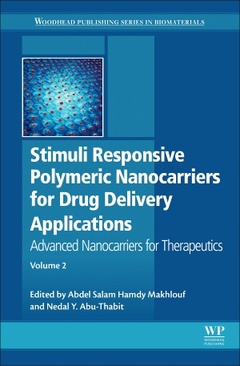Description
Stimuli Responsive Polymeric Nanocarriers for Drug Delivery Applications
Volume 2: Advanced Nanocarriers for Therapeutics
Woodhead Publishing Series in Biomaterials Series
Coordinators: Makhlouf Abdel Salam Hamdy, Abu-Thabit Nedal Yusuf
Language: English
Subject for Stimuli Responsive Polymeric Nanocarriers for Drug...:
Keywords
Anticancer; Anticancer drugs; Biological-stimuli; Block copolymers; Cancer; Cancer immunotherapy; Cancer therapy; Carbon nanotubes; Cellular immunity; Chitosan; Colon targeting; Commercially available insulin formulations; Controlled release; Copolymer; Critical micelle concentration; Cytoplasmic delivery; Diabetes mellitus; Drug delivery; Drug delivery system; Drug targeting; Dual-responsive polymer; External stimuli; Hydrogel; Image guidance; Imaging-guided therapy; In vitro; In vivo; Insulin delivery systems; Ionic-strength; Liposome; Lower critical solution temperature (LCST); Magnetic nanoparticles; Magnetic resonance imaging (MRI); Matrix metalloproteinases; Micelles; Multiresponsive controlled release; Multiresponsive nanoparticles; Multistimuli; Multistimuli-responsive; Nanocarriers; Nano-carriers; Nanomedicine; Nanoparticles; N-isopropyl acrylamide (NIPAM); Ocular; Oral insulin delivery; Oxide-hydrogel for local hyperthermia; Pectin; pH responsive; pH-responsive polymer; pH-sensitivity; Polymeric carriers; Polymeric formulations; Polymeric micelles; Polymeric nanocarriers; Polymeric nanoparticles; Polymers; Polymersomes; Polypeptides; Polysaccharide; Quadruple-stimuli responsive; Redox and pH dual-responsive; Remote cancer treatment; Responsive; Responsive polymers; Responsiveness; Stimuli; Stimuli response; Stimuli responsive; Stimuli-responsive; Stimuli-responsive polymer; Stimuli-responsive polymers; Synthetic polymers and SPIONS; Targeted drug delivery; Temperature-responsive; Temperature-sensitivity; Theranostics; Therapy; Thermal and magnetic sensitive nanosystems; Thermoresponsive polymer; Thermosensitive nanohydrogels; Tri-stimuli responsive; Tumor; Ultrasound responsive
637 p. · 15x22.8 cm · Hardback
Description
/li>Contents
/li>Readership
/li>Biography
/li>Comment
/li>
Stimuli Responsive Polymeric Nanocarriers for Drug Delivery Applications:Volume Two: Advanced Nanocarriers for Therapeutics discusses, in detail, the recent trends in designing dual and multi-responsive polymers and nanoparticles for safe drug delivery. Chapters cover dual-responsive polymeric nanocarriers for drug delivery and their different stimuli, multi-responsive polymeric nanocarriers, and the therapeutic applications of stimuli-responsive polymers. With an emphasis on advanced medical applications and synergistic operational and technological methodologies for the improvement of polymers systems for the production of stimuli-responsive polymers, this book is essential reading for materials scientists and researchers working in the drug delivery and pharmaceutical industries.
As innovation and development in the area of stimuli responsive polymer-based nanomaterials for drug delivery is moving fast and there is an increased global demand for biodegradable and biocompatible responsive polymers and nanoparticles for safe drug delivery, users will find this to be a timely resource.
Part I - Dual-Stimuli Responsive Polymers 1. Redox and pH-responsive polymeric nanocarriers 2. Magnetic and pH-responsive polymeric nanocarriers 3. Temperature and pH dual-stimuli responsivepolymeric carriers for drug delivery 4. Dual-nanosystems with thermal and magnetic stimuli-responses: In vivo current advances
Part II - Multi-Stimuli Responsive Polymers 5. Multi-responsive polymeric carriers 6. Multi-stimuli-responsive magnetic assemblies
Part III - Stimuli Responsive Polymers for Theranostic Applications 7. Smart Internal and External Stimulus-Responsive Nanocarriers for Image-guided Therapy and Drug Delivery Applications 8. Stimuli-responsive polymers for image-guided therapeutic applications 9. Polymeric nanoblends as biomedical nanocarriers: current developments and preclinical investigations
Part IV - Stimuli Responsive Drug Delivery Systems 10. Ionic-strength responsive polymers for drug delivery applications 11. Dual and multi-stimuli responsive block copolymers for drug delivery applications 12. Stimuli-responsive polymeric micelles for intracellular and extracellular drug delivery 13. Stimuli-responsive polymer-modified liposomes and their application to DDS 14. Thermo-responsive polymers for drug delivery applications 15. Carbon nanotubes for drug delivery 16. Stimuli-Responsive polymersomes for Drug Delivery Applications
Part V - Stimuli Responsive Polymers for Cancer Therapy 17. Stimuli-responsive polymersomes for cancer therapy 18. Responsive Polymeric micelles for Drug Delivery Applications/ Cancer Therapy
Part VI - Stimuli Responsive Polymers for Therapeutic Applications 19. Stimuli-responsive polymers for oral drug delivery applications 20. Stimuli-responsive polymers for ocular therapy 21. Stimuli-responsive polymers for treatment of Diabetes Mellitus 22. Stimuli-responsive polymers for oral insulin delivery 23. Stimuli-responsive Polysaccharides for Colon Targeted Drug Delivery
Part VII - Future Trends and Challenges 24. Future trends, challenges and opportunities with responsive polymer-based drug delivery systems
materials scientists, pharmaceutical scientists and biomedical engineers based at universities, national labs, and medical device companies.
Dr. Nedal Abu-Thabit holds a Ph.D. in chemistry with specialization in polymer chemistry. Currently, Dr. Nedal is an associate professor in the Chemical & Process Engineering Technology department at Jubail Industrial College. Since 2013, he holds the position of the Program Director for Polymer Engineering Technology major. Dr. Nedal has p
- Focusses on the most advanced technologies, recent evaluation methods, technical aspects, and advanced synthesis techniques stimuli-responsive polymers
- Examines advanced medical applications of stimuli responsive polymers
- Analyzes synergistic operational and technological methodologies for the improvement of polymer systems for the production of stimuli-responsive polymers in drug delivery




